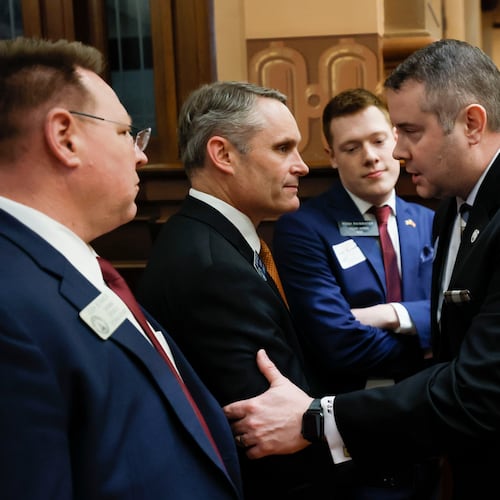Are you ready for “Liberation Day,” Georgia?
No longer will you be oppressed by your neighbor’s BMW in the driveway or the flat-screen TV you bought for Christmas. You only bought the bigger TV because it came from Costco — and also from China. But you won’t have that problem much longer, either.
That’s because Wednesday is the day President Donald Trump has promised to “liberate” the American economy with a swath of 25% tariffs on entire countries, sectors, or imported goods and materials. Some country’s tariffs could be much higher or totally eliminated, based on the president’s choices, which Trump said he’ll unveil late Wednesday afternoon in a Rose Garden ceremony.
Other countries “have been ripping us off for 50 years, maybe longer, they’ve been ripping us off from the beginning,” Trump explained Monday in the Oval Office, with a red, white and blue-bedazzled Kid Rock standing next to him. “We help everybody, and they don’t help us.”
The president didn’t give exact details, but he said new levies will hit anyone and everyone not making their products in America. And if a country retaliates with new tariffs on American products, he warned, “Whatever they charge us, we’re going to charge them. The friend, in many cases, is worse than the foe.”
That may be true for Trump. But if he needs an example of how to jump-start American manufacturing with the opposite approach, he could skip the tariff announcement and drive south to Georgia, where new factories are rising along interstates from Rome to Savannah and LaGrange to Commerce.
The current Georgia manufacturing boom is courtesy of Gov. Brian Kemp and a long line of governors before him, all the way back to Democratic Gov. George Busbee, who looked overseas for new markets, new allies and new customers for whatever Georgia was selling. Although previous international trade deals hollowed out the state’s textile manufacturing sector, new deals have backfilled those losses, particularly in rural areas of the state where the jobs were most needed.
Today, instead of threatening potential trading partners, Kemp makes it a point to go to them, traveling to Korea, France, Israel, Germany or other countries multiple times a year to meet foreign leaders and businesses and pitch them on making their products in Georgia.
“Honored to meet with President Yoon to reflect on the stronger than ever partnership and prosperity between Georgia and the Republic of Korea,” was a typical post on social media from Kemp last year.
Along with the charm offensive, the Georgia bargain has included inexpensive land, relatively low-cost, nonunion labor and generous tax breaks (some would say too generous) for companies that plant their roots here. Crucially, state leaders have worked to strengthen the state’s university system and start the QuickStart program through the state’s technical colleges, which trains local workers for specific companies and industries.
The result of all of that has been new overseas markets for Georgia exports and new foreign investments in the state, the largest of which has been Hyundai’s $7.6 billion metaplant outside of Savannah. Kemp was at the plant last week for its grand opening, where the chairman of Hyundai Motor Group announced they’ve already decided to boost production by two-thirds there.
“Gov. Kemp, Gov. (Nathan) Deal and Gov. (Sonny) Perdue all took the approach to business and economic development that investment is like water; water follows the path of least resistance,” said Butch Miller, the GOP Senate majority leader during Kemp’s first term as governor. “If you set barriers and hurdles to investment and business, it’ll go in a different direction.”
Miller is no longer in politics, but he is still a Honda dealer in Gainesville. He said that if the Trump tariffs are high and sustained, they will reshape the auto industry forever. Companies may eventually bring more manufacturing to the U.S. under duress, but the process could be long and painful.
“It’ll mean higher prices for consumers, because the tariffs will increase the cost of imported vehicles and auto parts,” he said. Also complicating the equation is the multinational nature of modern manufacturing. As an example, he pointed to a single piston, which is made of aluminum smelted in Canada, shaped in Detroit, shipped to Mexico to be put into a car engine, and then imported back to the U.S. for final assembly. How many times is the piston taxed?
Overall, he concluded, “I’d take the Kemp-Deal-Perdue approach.”
Chris Clark, the president and CEO of the Georgia Chamber of Commerce, said he hears anxiety about new tariffs coming from farmers, who export everything from poultry and cotton, as well as from manufacturers who import components for their final products, and from foreign companies with operations here.
“There is just a lot of concern about the repercussions that could come for all of them,” he said of Trump’s tariffs.
Like Butch Miller, Clark said Georgia leaders have taken the proactive, relationship-based approach to increasing trade. In the carrot versus stick approach to making deals, the carrot just works better.
“I say that all the time at the Georgia Capitol: Please give us the carrot. We much prefer to be incentivized to do something. That’s obviously the preference of business,” Clark said. “The other preference is just stability. Tell us what the rules are. Give us time to adjust to the rules. We thrive in consistency.”
Who wants to tell the New Yorker in the White House that tax breaks and Southern hospitality, not threats and tariffs against our closest allies, are the way to make American manufacturing great again? In Georgia, it’s already working.
About the Author
Keep Reading
The Latest
Featured





